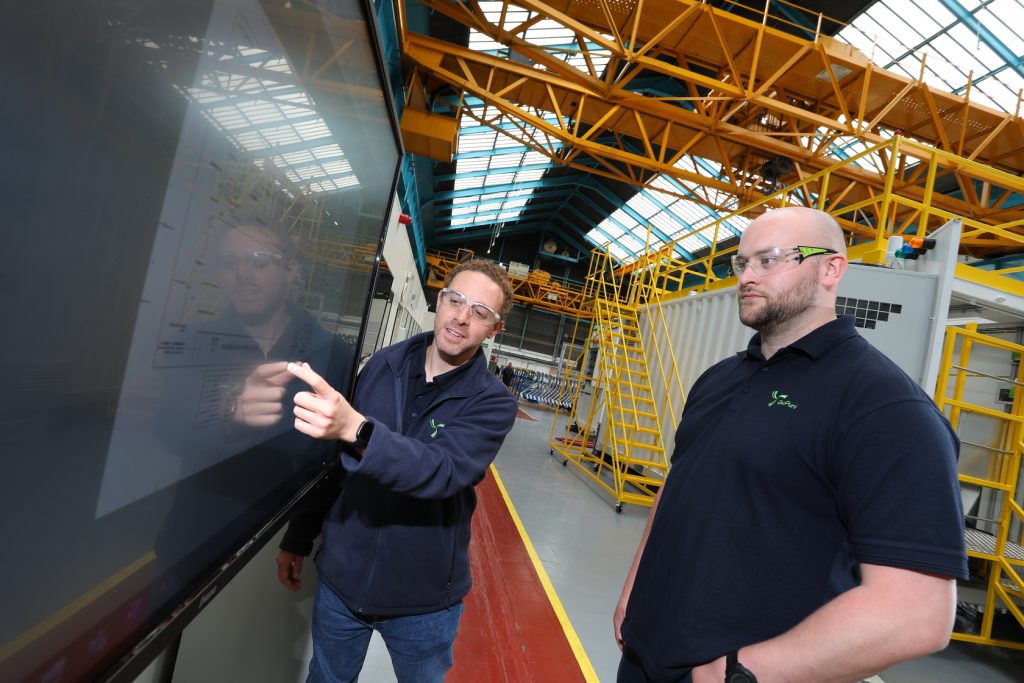What does GeoPura do?

GeoPura™ was founded in 2019 to decarbonise our global economies by sourcing enough clean, renewable energy to move away from fossil fuels and navigate the logistical issues of getting this energy to where it’s needed.
GeoPura is enabling the production, transport and use of zero-emission fuels with innovative and commercially viable technology to decarbonise our global economy.
What is a Hydrogen Power Unit?
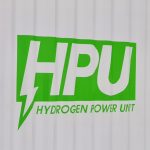
The GeoPura Hydrogen Power Unit (HPU) is a world first, building on 10 years of research and development in the UK to efficiently combine state of the art hydrogen fuel cell technology, battery storage, real time electrical conversion and control to create a highly resilient, transportable and commercially competitive generator/uninterruptible power supply unit.
A GeoPura HPU is built on industrial hydrogen fuel cells, and provides 250kW electrical output, 80kW thermal power and 216kWh battery storage. Packaged within a standard 20ft shipping container, a GeoPura HPU and a supply of green hydrogen can be delivered to almost any location providing easy access to emissions free electricity.
How does a HPU work?

The GeoPura HPU is a clean energy solution that delivers large-scale, reliable energy wherever and whenever the grid cannot support. Here’s how it works:
1. Renewable Energy: The process starts with renewable energy, such as electricity from wind or solar PV.
2. Water Electrolysis: Water electrolysis is then used to generate hydrogen, which is stored to use as a fuel.
3. Transportation: The hydrogen is transported via road to any location, where a GeoPura Hydrogen Power Unit is ready to convert it to green electrical power.
4. Fuel Cell: The hydrogen and air are fed through a fuel cell which produces DC electricity.
5. Inverter: The DC electricity is then converted to AC using inverters.
6. Power Conditioning: The power is then conditioned to deliver clean and uninterruptable, 400V three-phase AC electricity.
7. Advanced Power Controls: Advanced power controls and onboard batteries are also utilised to ensure a fully redundant, critically backed supply capable of peak shaving and grid augmentation as well as providing off-grid energy for a range of applications.
8. Emissions: The only emissions are water and heat, which can be used elsewhere on site, offering a clean and sustainable solution.
Watch the video below to find out more.
Why hydrogen?

To deliver our net-zero commitments, a carbon-free future needs to be fuelled with renewable energy, way beyond the capabilities of any electricity distribution network. By producing green hydrogen we have found a way to store and transport renewable energy as a fuel so that it’s available where and when we need it.
Hydrogen made with renewable energy is completely carbon-free. And when you turn it into electricity, via our HPU, the only emission is water. It’s also easy to store and transport, allowing us to use renewable energy sources to their full potential.
Where does the green hydrogen come from?
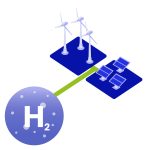
GeoPura produces green hydrogen in the UK using renewable energy. See behind the scenes at how we produce, store and transport our own green hydrogen for use in GeoPura HPUs that produce zero emission electricity for a range of off-grid, temporary and back-up power applications.
We are in the process of establishing subsequent electrolyser installations to increase the volume of green hydrogen we produce to enable us to support a greater number of HPUs as our fleet expands.
In addition we also have offtake agreements in place with a number of the major gas suppliers to supplement our own production and enable us to serve our customers effectively as the supply infrastructure grows.
What are the benefits of using a HPU?
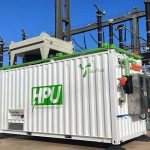
GeoPura has demonstrated that industry can transition seamlessly to using our HPUs for clean power, cutting all harmful emissions associated with diesel generators and drastically reducing noise pollution. A truly innovative solution, our HPUs provide reliable, clean energy and an opportunity for industry to meet environmental targets, operate successfully in zero emission zones and support the global race for net zero.
When the HPUs are fuelled with green hydrogen – hydrogen that is produced using renewable energy and water electrolysis – the process is entirely emissions free from start to finish. Unlike diesel and bio replacements like HVOs, which still produce harmful NOx emissions when combusted and can have a devastating impact on natural habitats.
A HPU is also extremely resilient and reliable. Should the hydrogen supply ever be interrupted, the in-built battery back-up keeps the unit delivering power.
Unlike traditional reciprocating combustion engines in diesel generators that operate at high temperatures and pressures with mechanical stress and relatively high failure rates, in contrast an HPU fuel cell is a relatively low temperature, low pressure environment where power is delivered directly as electricity and comparatively few moving parts are required. The HPU also includes a resilient inverter configuration, industrial UPS technology and a high capacity battery system resulting in the highest possible level of long term reliable, critical power.
The HPU can be configured to deliver combined heat and power (CHP), providing hot water and heating for on-site welfare units, sanitary facilities, or other requirements. We can also integrate highspeed EV charging to enable electric site vehicles to be charged and used on site.
How does a HPU compare with a diesel generator?

A typical 250kVA diesel generator would emit 960g of CO2 per kWh, as well as 932.5g of NOx/HC, and 327.5g of CO per hour of operation; the HPU emits zero pollutants. The only emission is pure water and the unit emits far less noise pollution.
Diesel generators are now actively discouraged or banned in many applications due to unacceptable emissions. The noise and pollution associated with diesel generators are particularly unwelcome in welfare and populated settings.
Key differentiators from diesel generators include:
– HPUs do not emit any of the pollutants that diesel generators release. The sole exhaust is pure water, which can be put to use by customers for other purposes, which is normally a benefit at remote sites.
– The relatively quiet operations and lack of air pollution mean that HPUs are much more appropriate for use in built up areas, which may assist customers in obtaining necessary permissions for construction works.
– HPUs operate more efficiently than diesel generators, even more so when CHP benefits are taken into account. Comparatively, less fuel is used to achieve the required power output, due to efficiency, reduced wastage and more sophisticated management.
– Over the life of an HPU it is expected to avoid emissions of 1,800 tonnes of CO2 when compared to a diesel generator.
A HPU is far more than a direct replacement for a diesel generator.
What about transport emissions associated with the hydrogen delivery?

Given that certified renewable zero-emission power is used to create the hydrogen via an electrolyser, no CO2 is emitted during the production of the hydrogen. There is also zero CO2 emitted at the point of use. the only emission from hydrogen oxidation is water.
Although our intention is to use zero-emission transportation wherever possible, including electric forklift units for unloading, we recognise that road logistics in the UK are not yet at this stage. We anticipate transportation may contribute emissions equivalent to 1-2% of energy content depending on the vehicle, and may have to be considered as part of the evaluation.
How much power can a HPU provide?
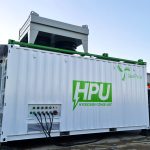
The GeoPura HPU provides 250kVA of standard three-phase, 400V critical electrical power backed up by an integral 216kWh battery system and can effectively replace on-site diesel generators with an emissions-free alternative.
The units can be run in parallel to deliver up to 2MW of power, used to provide combined heat and power systems, and supply all standard AC loads including EV chargers.
Is a HPU noisy?

No, a HPU operates relatively quietly at 65dBA at 1m, significantly below the noise levels of an equivalently-sized diesel genset at approximately 85dBA. Whilst its not silent, its 10 times quieter than a diesel generator meaning that its ideal to operate in built up areas or on TV and film production sets.
Note that because dBA is a logarithmic scale, used because of the wide range of human hearing, 20dBA makes a lot of difference. The definition of dBA means that an 85dBA noise is 10 times more powerful than a 65dBA noise.
How much space do I need to run an HPU?

An average site with bulk hydrogen storage requires 12mx10m – this accommodates the HPU, bulk fuel storage and delivery access safely.
However, this varies from site to site and dependent on hydrogen use requirements – for example if hydrogen is delivered in MCPs (smaller ‘forkliftable’ hydrogen storage units) the minimum reduces significantly as there are smaller more mobile units.
Our team will conduct a site inspection to assess the space requirements and plan the most effective solution to meet the power needs.
What is the set-up time for an HPU?

Set up is generally completed in a few hours. Sometimes it can take longer depending on power distribution requirements, however this will be established at the initial site visit and our team will work with the customer to help set this up.
How much hydrogen will I use compared to diesel?

GeoPura commercially supply hydrogen by the ‘litre dge’ which stands for litre diesel generator equivalent, where 1 ldge of hydrogen is the amount of hydrogen that would allow a Hydrogen Power Unit (HPU) to produce the same amount of electricity that would be obtained from 1 litre of diesel consumed by a diesel generator (internal combustion engine).
This allows you to correlate the amount of diesel you use to the power output required. For example, if a given site uses 1200 litres of diesel a week, then that site knows they will need 1200 litres dge of hydrogen and can immediately compare costs etc. Also, the price of hydrogen per litre dge allows direct comparison with the price of diesel or HVO.
In practice 1 litre (dge) hydrogen produces about 2.75 kWh of electricity (the same as 1 litre of diesel in a diesel generator). This will equate to about 168 grams of hydrogen i.e. 1 kg of hydrogen consumed by the HPU is equivalent to about 6 litres of diesel consumed by a diesel generator.
Is hydrogen more expensive than diesel?
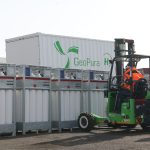
In short, yes. However, as the price of diesel increases, and the cost of green hydrogen comes down we are seeing the premium reduce significantly and hydrogen become commercially comparable.
A HPU is not a direct replacement of a diesel generator and further to the direct cost of the fuel, customers are finding that that they use a lot less hydrogen than initially anticipated due to reduced wastage and more efficient power control. Currently, the price delta of the fuel is minimal, and customers are prepared to pay this for the added benefits that green hydrogen offers.
Over and above the carbon savings, these benefits include less downtime as a result of increased reliability, increased efficiency of 24/7 operations as a result of reduced noise levels and improving the air quality and operating environment for those working and living nearby.
Is hydrogen safe?
Hydrogen is a fuel and just like other site fuels, such as Propane or Diesel, has to be treated with appropriate care.
The specific physical and chemical characteristics must be taken into consideration when moving or using any fuel. In some ways the risks associated with Hydrogen can be easier to control e.g. whilst a diesel leak will typically result in a pool of ignitable diesel, hydrogen being much less dense than air will in many situations rapidly disperse safely. On the other hand hydrogen is normally stored as a compressed gas that brings other risks associated with assuring reliability of storage containers. On balance the danger is no greater or less than current fuels we deal with i.e. propane, diesel etc.
What safety regulations do HPUs comply with?

GeoPura operates strictly in compliance with The Construction Design and Management Regulations (CDM 2015 Regulations) to ensure that health and safety issues are properly considered during the delivery, setup, operation and management of any GeoPura technology and associated ancillaries at any site on which we operate.
Working closely with existing management procedures, and policies at any given site to ensure that that the risk of harm to both GeoPura and location/site specific staff is fully reduced.
We undertake a series of controlled risk assessments and produce comprehensive
method statements around all aspects of GeoPura operations including, site setup, delivery and drainage, hydrogen delivery supply and changeover staff safety and wellbeing, lifting, working at height and safe use of equipment and plant.
How is the fuel (hydrogen) delivered?

Fuel is delivered by HGV. Larger loads via articulated truck, MCP’s using a flatbed or HIAB. GeoPura operate one of the UK’s first fully electric HIABs to off load the MCPs at site. Connection to the generator is via an included hose and regulator system.
Fuel is supplied at between 300 and 150 bar and the generator system includes regulation to 10 bar internal operating pressure.
Do I need training to operate a HPU?
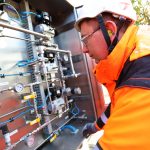
GeoPura offer Energy as a Service – meaning that we deliver, set up, fuel and operate the unit on your behalf, making it simple to switch power supply on site.
What happens if a HPU breaks down?
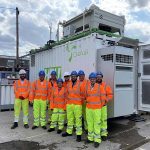
GeoPura has a growing team of field service technicians operating 24 hours of the day to manage any unforeseen issues. We are able to access and monitor the units remotely via our control software and can deal with any alerts as needed, maximising the UPS to maintain power supply.
Where have HPUs been used so far?
Since our launch in 2019 we have we’ve delivered power to a range of applications including uninterrupted live broadcasts (BBC Winterwatch / Springwatch), scalable EV charging (Polestar 1 European Press Drive), long-term construction (National Grid’s Viking Link interconnector project , HS2 Crossover Box) and TV production (Netflix).
GeoPura has demonstrated that industry can transition seamlessly to using our HPUs for clean power, cutting all harmful emissions associated with diesel generators. Find out more in our case study section.

